Aromatherapy. You have heard about it, you have probably used it, and it’s not anything new. However, the use of aromatherapy to solve almost every physical problem is a recent phenomenon.
Maybe you know a friend who uses peppermint oil for nausea, another swears that lavender calms them down, and the mental health community claims that lemon oil reduces agitation in dementia patients.
One area where aromatherapy has gained cult popularity is with sleep, but can it really help you sleep better?
According to scientific research scidding a drop or two of essential oils like lavender on your nightstand diffuser can help you fall asleep much faster and sleep more deeply throughout the night as well.
Considering that 33% of adults have short-term insomnia, it’s no wonder the essential oils business has grown to a billion-dollar industry in such a short time. But, before you take our word for it, let’s find out what the research says.
What is Aromatherapy?
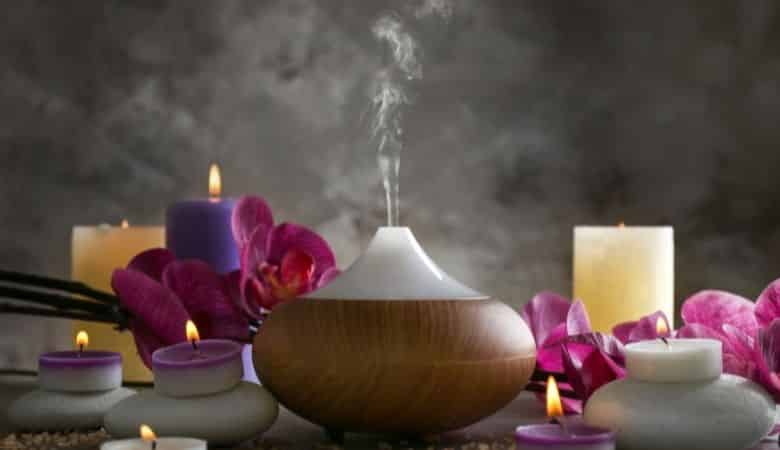
Aromatherapy is basically inhaling essential oils for therapeutic purposes. If you haven’t heard about them, essential oils are plant extracts derived from various parts of the plant, including roots, leaves, bark, and flowers.
The word ‘essential’ comes from the fact that these oils contain the pure essence of the plant: the fragrance or the natural chemical used in therapy. Examples of essential oils include lavender, lemon, eucalyptus, bergamot, cedar leaf, clary sage, and chamomile.
Aromatherapy is an old age practice and is only gaining momentum now because people are going back to their roots. When inhaled, the scent from essential oils stimulates the olfactory system, the part of the brain connected to smell. Once the smell reaches the brain, it affects the limbic system, which is linked to the heart rate, emotions, memory, stress, hormone balance, and breathing. This is how essential oils are able to affect the body in various ways.
That said, essential oils can also be absorbed through the skin and reach the brain in the same way. A massage therapist can add a few drops to the massage oil, or you can include essential oils to your lotion or bathwater.
Can Aromatherapy Really Help You Sleep?
While there is limited research on other benefits of essential oils therapy, the connection between aromatherapy and sleep has been well established.
One 2015 study at Wesleyan University had 31 men and women inhale lavender oil one night and distilled water the next. Researchers looked at their sleep cycles through brain scans and found that lavender oil increased slow and deep wave sleep. Subjects also reported feeling more energized following lavender night.
Another study at the University of Southampton tracked ten adults for a week. Five of them slept in a room with lavender oil diffused in the air and the other 5 had sweet almond oil. The groups switched places after a few days. At the end of the study, subjects reported that sleep was better in a lavender-scented room.
A 2017 study was conducted to assess the effect of aromatherapy massage on the sleep quality of night shift nurses. Evidently, people who work on the night shift suffer from sleep disorders due to the disruption of the circadian biological clock of humans. As a result of not sleeping enough, these people suffer from fatigue, poor concentration, and other health issues. In this study, the nurses who got the aromatherapy massage and slept in the same aromatherapy room reported improved sleep quality and more energy the following day.
Lastly, a study was conducted on the effect of aromatherapy on sleep quality in menopausal women with sleeping issues. Of the 57 menopausal women, 27 were subjected to aromatherapy, and the other 30 to a placebo. At the end of the study, it was found that aromatherapy increased sleep quality in women with sleep problems during menopause.
Best Essential Oils for Sleep
There are at least a hundred essential oils in the market today, all with different therapeutic benefits. However, not all of them can contribute to your quality of sleep.
However, the 7 essential oils listed below have been tried and tested by many and are sure to help you sleep faster and more deeply. Note that different people react differently to the same essential oil, so it’s important to find the one that works for you.
1. Lavender
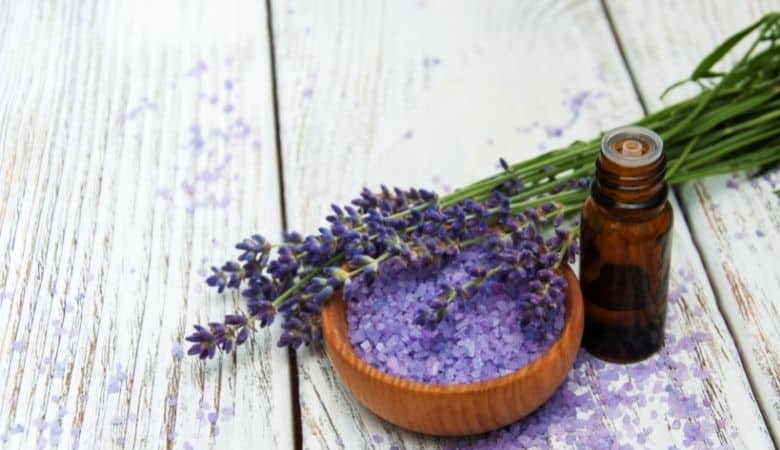
Lavender essential oil is the most studied where sleep is concerned. It is a wonderfully fragrant oil that comes from a purple flowering shrub. Lavender is so effective for improving sleep quality because it calms the nervous system thanks to its chemical compounds linalool and linalyl acetate. Many studies show lavenders positive effect on sleep in various people;
- Women and younger people who have insomnia reported improved sleep after inhaling steam with lavender oil.
- Postpartum mothers who inhaled lavender enjoyed improved sleep.
- Patients with coronary artery disease experienced reduced anxiety and better sleep after inhaling lavender oil.
- Students exposed to lavender aroma at night reported reduced sleepiness the following day.
Looking for a good lavender essential oil? Check out this list of lavender oils available on Amazon.
2. Chamomile

Chamomile tea has been the go-to drink for people who struggle to fall asleep or suffer from anxiety. The less known version of this miracle drug is chamomile essential oil, more specifically Roman chamomile oil. This oil is known for reducing anxiety and inducing calmness throughout your body which makes sleeping easy.
A blend of roman chamomile, lavender and neroli was used to reduce anxiety and improve sleep quality in a study of patients in the I.C.U. Roman chamomile has also been used to reduce anxiety in pregnant women and nurses. When combined with lavender oil, the blend is a potent cause for sleep and deep sleep, for that matter.
Looking for a good chamomile essential oil? Check out this list of chamomile oils available on Amazon.
3. Cedarwood

As you can tell from the name, cedarwood oil has a woodsy scent that’s very calming. The essential oil has a sedative effect thanks to a chemical compound called cedrol. Unlike other essential oils that seem to have different effects to different people, cedarwood causes sleepiness to everyone no matter their age or sleep issues.
In fact, a 2017 study shows that aromatherapy with a blend of cedarwood, cypress, and pine oil could help improve sleep quality in adults with dementia. Researchers recommend using the oil for at least 20 days to see long-term effects on sleep quality and lower anxiety levels.
Looking for a good cedarwood essential oil? Check out this list of cedarwood oils available on Amazon.
4. Clary Sage Oil
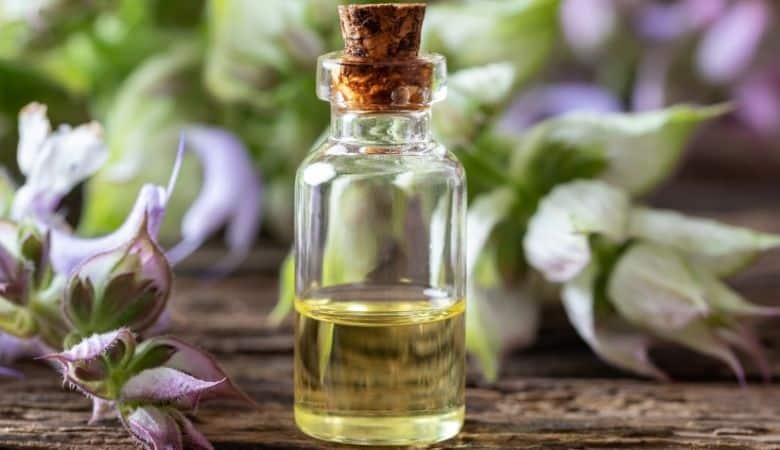
Many people know clary sage as an herb used to add aroma and taste to food. However, clary sage is also used as an essential oil for its sleep-inducing properties. Studies on this southern-Europe herb show that it has an antidepressant effect and reduces cortisol levels. Since cortisol affects circadian rhythms, reducing cortisol may promote sleep.
In other studies, clary sage essential oil reduced stress in patients and lower their blood pressure and respiratory rate. If anxiety interferes with your sleep, inhaling some clary sage oil can help you sleep much better.
Looking for a good clary sage essential oil? Check out this list of clary sage oils available on Amazon.
5. Vanilla

Everyone is familiar with the smell of vanilla cookies. They smell like home, remind you of your grandma and make your body feel like curling in a warm blanket and fall asleep on the couch. This is the effect vanilla essential oil has on your body when inhaled.
The oil has a relaxing, stress-relieving, and sedative effect that will knock you out faster than any pill. It also reduces anxiety, restlessness, and hyperactivity, helping to quiet the nervous system and lower blood pressure. Sleeping under the scent of vanilla will not only help you sleep better but you’ll also wake up happy and more energetic.
Looking for a good vanilla essential oil? Check out this list of vanilla oils available on Amazon.
6. Sandalwood
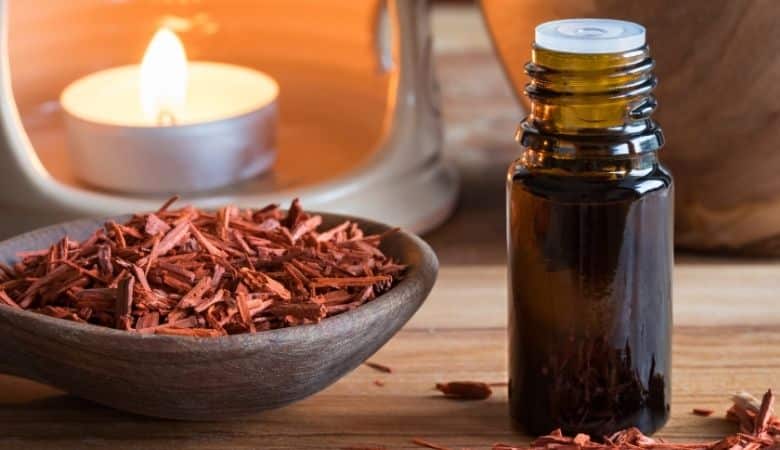
Like Cedarwood, this essential oil has a rich woody and earthy scent. Sandalwood has a long history of use as relaxation and anxiety-relieving oil. One study shows that sandalwood is very effective in easing anxiety and can have potent sedative effects. Inhaling the oil reduces wakefulness and increases the amount of non-REM sleep.
Looking for a good sandalwood essential oil? Check out this list of sandalwood oils available on Amazon.
7. Ylang Ylang

While not as potent as lavender for sleep, ylang-ylang is still an excellent essential oil when it comes to aromatherapy for sleep. This Asian extract lowers blood pressure and heart rate and quite literally sets your body up for sleep.
When inhaled, the oil has a very fruity and pleasant scent which is calming and incredibly relaxing on its own. According to a 2014 study, using ylang ylang in aromatherapy helps reduce anxiety and promote self-esteem. This essential oil is very potent and can irritate the skin so it’s better used in a diffuser to inhale.
Looking for a good ylang-ylang essential oil? Check out this list of ylang-ylang oils available on Amazon.
How to Use Aromatherapy for Sleep
So, you’ve got your essential oil or a blend at hand and now you are wondering how to use them. Experiencing the aromatic effects of essential oils can be done in various ways. Note however that the oil itself plays a huge role in how you should use it as some are very potent.
1. Use a diffuser
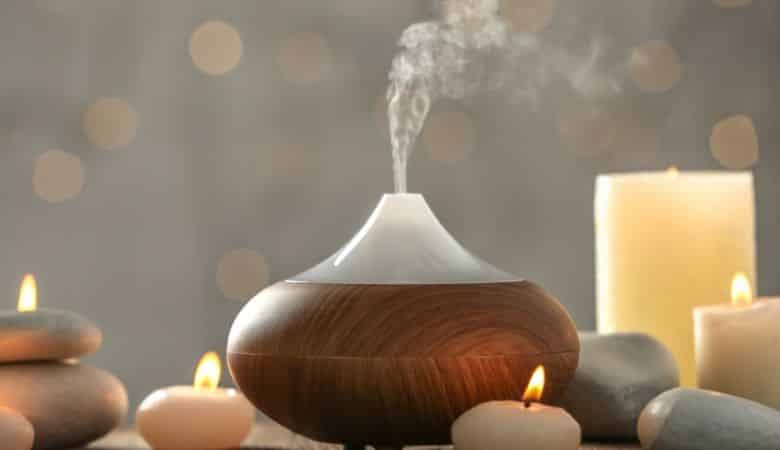
A diffuser is a simple apparatus that will disperse the oil into the air slowly throughout the night. More often than not, you fill a diffuser with water and add 3 to 5 drops of your chosen essential oil in the water. As the steam evaporates into the air, so does the scent of the oils as it slowly envelopes your mind and nervous system.
Amazon have many great aromatherapy diffusers available here. There are a ton of reviews available on most products listed, so if you are looking for a diffuser we recommend checking out the reviews before you decide on a purchase.
2. Add the oil to your bathwater
Taking a bath before bed is an excellent way to relax and wind down for sleep. If you add a few drops of essential oils to the water, you get to inhale the scent as well as absorb the oils through your skin. Schedule your bath 90-60 minutes before bedtime so you can go straight to bed after.
3. Apply the oil to your pillow
You will be lying on your pillow throughout the night, so it makes sense that applying some essential oil to the pillow will work wonders. If the smell of the oil is too potent, apply it to the underside of the pillow or dilute the oil with some water.
4. Apply directly to your body
Experts recommend applying the essential oils to areas that are connected to your nervous system like the wrists and behind the ears.
A light massage using the essential oils works wonders too since a massage is also relaxing. If you choose to apply the oils directly to your skin, make sure you dilute them with a carrier oil like argan oil, coconut oil and extra virgin olive oil. This reduces the potency of the essential oils, so it doesn’t burn or irritate your skin.
5. Use scented candles
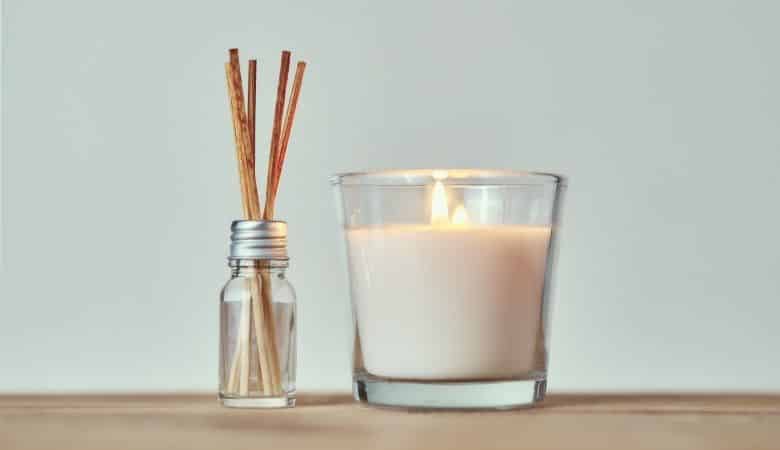
Lighting a candle infused with essential oils like lavender, jasmine, vanilla, and ylang-ylang before bed helps you to feel relaxed and drowsy as the candle fills the air with scent. Unfortunately, some candles are made of synthetic fragrances instead of essential oils, so they may not work as well.
Other Ways to Improve Your Sleep
As powerful as essential oils are in causing your body and mind to relax and fall asleep, they cannot work alone. These lifestyle changes will play a huge role in ensuring you fall asleep faster and sleep all night.
- Stay away from caffeine from 3 p.m as it keeps your heart rate fast which keeps you from sleeping.
- Seek help with anxiety, depression, and sleep apnea. If the reason you are not sleeping is medical, seek help so you can get treated and go back to a normal sleep cycle.
- Eat earlier in the evening to give the body time to digest food, especially if you suffer from digestion issues or acid reflux.
- Establish a bedtime ritual. A ritual alerts the body that it’s time to wind down and go to sleep mode. Simple strategies like taking a bath, brushing your teeth, changing into pajamas, and lighting a scented candle will do the trick. The ritual should also aim to be at the same time every day so the body can fall into a routine.
- Completely unplug an hour before bedtime. The blue light from phones and TVs interferes with your body’s melatonin production and delays sleep. Unplugging gives the brain time to produce the sleep hormones without disruption.
In Summary
If you want to explore aromatherapy for sleep, consult your doctor first. Some essential oils can interfere with medication and cause allergic reactions. Even with your doctor’s approval, know that essential oils are unregulated by the FDA, so it’s crucial to buy from reputable brands only.
If you decide to apply the oils on your skin, do a patch test on a small area of your skin, even after diluting, and give yourself 24-48 hours to see how it will react. That said, aromatherapy is really a subjective practice, and what works for one person may not work for the other. Try out different oils for at least 20 days, and you will be sure to find one or two that work for you.
